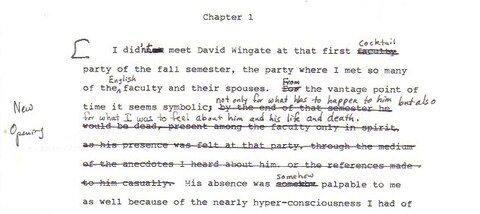
The typescript of my unfinished mystery novel, The Graves of Academe, runs 154 double-spaced pages and 16 short chapters typed on the back of pale dittoed handouts or photocopies of pages from my dissertation—if I reverse the pages, I can read discontinuous excerpts from "The Problematics of Marriage: English Comedy 1688-1710." The mystery's opening three chapters in first person are revised by hand to third; the prologue and 13 more chapters, written years later, are in third person. Eight more chapters were tentatively planned.
I vaguely recall starting it in 1976 on highways between Iowa and Michigan. Unemployed after my post-doctoral year, Central Michigan University had turned me down for a composition position, but then abruptly hired me when a senior professor died unexpectedly and I was the only rejectee who could teach his popular course, the Bible as Literature. Thus was my career launched. Driving interstates alone, talking out loud to stay awake, I started to generate a first-person narrative about a recent midwestern-PhD hired precipitously at a Great Lakes university where the death of a senior faculty member—a murder—would require him to teach the victim's Shakespeare class.
I wrote those first three chapters but then the demands of preparing new classes and seeking academic standing through conference papers and creating a scholarly book from a dissertation chapter made me set it aside. It wasn't until years later, again making solitary cross-country road trips, that I remembered generating scenes aloud and thought of completing the mystery. Changes in my life over six years altered the manuscript's outlook. Chapters 4 through 16 would now be in third person and take a different perspective. While John Rice, the mystery's protagonist, and I had both left midwestern grad schools for Great Lakes universities, both expecting to move on after three years so our schools could avoid giving us tenure, I at least would receive tenure and stay there a total of 28 years. I had been divorced and lived alone for a few years until eventually marrying again; Rice's bachelor relationships with women had become more complicated and I imagined him taking a trilogy of murder mysteries to work everything out.
Recently I read The Graves of Academe typescript again, expecting to clean up typos and copy the text onto the computer, but by the time I reached the end, I felt no impulse to complete its narrative. Much of what's there no doubt displays aspects of who I was when I started it, and especially when I tried to continue it, but I don't identify with John Rice as I once did. My relationship to the plot line and the characters changed and I couldn't imagine reviving commitment.
As it turns out, I'd forgotten also later completing a different detective story. "Cruel as the Grave" was submitted to Alfred Hitchcock's Mystery Magazine and very quickly rejected. It's a straight-forward detective story, 49 typescript pages long, in which Lt. Will Dryden investigates and solves the case handily and is spurred by the background of the murder to recognize a need for romance in his own life. Its dialogue and plot conform to the conventions of mysteries I'd read and television episodes I'd viewed and drew on elements of investigation and police procedure I'd witnessed often in programs we'd watched. Except for some of the detective's angst about his earlier divorce, I don't sense much of a personal investment from me in the narrative. That is, it is very much different from The Graves of Academe where I can zero in on the background inspiration for certain characters and situations. Probably the Hitchcock magazine found it formulaic, maybe even predictable. I didn't pursue publication for it after that rejection.
What I realize now is how much writing of various kinds I was doing when I flirted with mystery writing. I'd spent a year as a singer-songwriter, been writing around 35 short essays for local public radio annually, and published my first academic book. In addition to a second marriage and a new household and an expanding academic career, enough was happening to make inventing mysteries an unnecessary distraction. I had sound professional reasons for turning to scholarly writing and considerable pleasure in all that other writing—perhaps my critical and creative needs were well satisfied when I stopped writing fiction.
That may be what I've learned revisiting the fiction I wrote in the past. The stories that seem to work best are those where some part of me inhabits the central character, where the narrative grows out of issues that nag at me, where the storytelling at least provides some tentative resolution that partly satisfies me, whether it satisfies the character who grew out of me or not. I gain more by writing essays and memoirs.